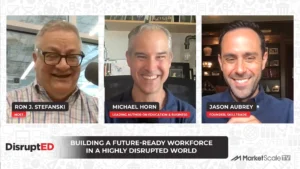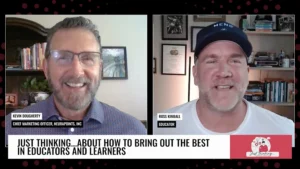How Google’s Data Center Investment is Shaping Real Estate Strategy
Google announced that it will be spending $7 billion on new office space and data centers in 2021. This comes as many Americans are returning from post-pandemic work restrictions. To comment on the issues and opportunities for the commercial office space market, Ryan Hoopes of Cushman and Wakefield joins Hilary Kennedy on MarketScale TV. Watch or read the full interview below.
—
Hilary Kennedy:
Hi, I’m Hilary Kennedy in the MarketScale studios. And with me today is Ryan Hoopes. He is a principal leader with Cushman and Wakefield’s banking and financial services practice in Dallas, which focuses on real estate strategy and advisory in the rapidly changing environments of both traditional financial institutions and the fast growing FinTech companies. I have asked him to share his perspective on commercial real estate in 2021, the issues, the opportunities, how things are shaping up as we’re reopening across the country. So thank you for being here
Ryan Hoopes:
Great to be here. Thank you.
HK:
So Ryan, let’s start with Google. They haven’t abandoned traditional workplaces just yet. They recently announced plans to invest billions in real estate, specifically in the areas of office space and data centers. So would you say that this is a reflection of the growing footprint of Google as a tech giant?
RH:
Well, certainly. And they’ve been growing for over a decade now and taking down massive amounts of space and all the markets that they have employees, uh, I would say their, their commitment to continue to invest in office space is more of a signal that office space is going to continue to be very important for corporate occupiers all over the country, all over the world. Uh, and even our own, um, analysis and surveying and research is saying the exact thing. See the same thing.
HK:
Well, so when COVID hit commercial real estate, specifically office real estate, that was hit pretty hard. Um, new development started slowing down, demand slowed along with it, but even, you know, Google CEO, Sundar Pichai is that he doesn’t plan on a permanent remote strategy for his employees. So are we seeing a resurgence in office space? And if so, why are we seeing that now?
RH:
Absolutely. It’s a great question. And it’s been kind of the eight ball question for the last 12 months when the pandemic hit, every employer had to, send all their employees home for health reasons. And then the question became, okay, are they ever going to go back? And while the remote working experiment has worked well for anything that is process-oriented, transaction-oriented streamlined, uh, where it has been really, really detrimental. It was to areas such as business development, creativity, uh, mentorship, really things that you could say are the cultural lifeblood of a company. So now that we’re 12 months into it, most companies that have done their due diligence and are doing the surveying and doing the research are finding that it’s critical. They get back in the office in some way, shape or form. So that’s why you’re seeing Google. And there are the companies, uh, Facebook, Microsoft, Uber SAP, some of these technology companies that were on the of saying, Oh, we never have to go back to the office. Now they’re saying, no, actually we go back to the office.
HK:
Yeah. I thought that was interesting that Google said to you, this is really the lifeblood of our company is being able to collaborate in person and have that as part of our culture. So almost every industry is needing to utilize data centers in some form or fashion because a digital transformation that’s taking place. And also there’s just a massive amount of data from consumer metrics to internal communications, to network information, industrial machine processes, they all need hubs for computing. So in which industries do you foresee data center investment in the next several years? And then how do you think this is going to shape the real estate market and how they sell their space?
RH:
Sure, of course. Well, one of the biggest areas we’ve seen growth in data center utilization is banking and financial services. There’s such an important assist on collecting, maintaining information, uh, as well as protecting it. So you’re seeing massive amounts of, of time and effort and money and capital being invested by financial institutions into their data center. Right? Uh, the cloud is going to have an effect on the growth of data centers, but it’s only a part of data story data centers are going to continue to be important to companies large and small.
HK:
Well, so let’s talk a little bit more about Google since they are wanting to have more, uh, in-person collaboration moving forward. What sort of strategies are they taking towards a safe and productive and collaborative reopening of in-person work and how is this being brought to their new space?
RH:
Right. Well, I think that the answer to that question is two fold. One is what are companies doing right now to be safe and returned to office and, uh, social distancing practices, Cushman and Wakefield has been a forefront leader in coming up with those policies for companies such as the six-foot office, uh, you know, the directional signage, the cautionary is where you’re, you’re restricting the ability to come in proximity with each other. Cushman was one of the first companies to effectively come back to the office and we’ve been helping our clients do the same 12 months. Um, so taking those types of measures, following the CDCs recommendations, companies are effectively able to open up safe beyond that. Where the next question you’d be asking is what does it look like moving forward? You know, still thinking, keeping in mind the health and safety benefits were open.
HK:
The vaccines are gonna continue to instill safety, confidence, or growing safety and confidence in returning the office. But moving forward, have we moved to an era where our employees are going to need more schedules? Is it going to be a combination of working from home and working at the office? And the short answer is yes. I’m on the team that believes that we have fundamentally changed certain aspects of how employees are going to be working with for however, that does not mean a permanent work from home solution. It just giving your employees the option and the flexibility to work from home, as well as work in the office is going to be the future. There’s some really great examples of Microsoft recently going out and serving their thousands and thousands of employees. And they were so frightened by the results of what they were seeing with the work, from home experience that they are now coming and saying, we have to give our employees the option to come back to the office. Uh, you know, I saw one metric or 40% of their employees were thinking about leaving the company because they couldn’t come back to the office. So we started opening offices back up and at least giving them the option. And I think when companies give the option to their employees to return, they’re going to see a compounding effect on the interest to return.
RH:
Yeah, I think you’re so right. I think most people really enjoy a hybrid of those things, you know, having the flexibility to work from home if they need to, or want to certain days, but gosh, it’s really hard to replace that in-person interaction for sure.
HK:
All right. So let’s talk about the real estate market all over the country. Are you seeing it explode in some key areas? Um, and if so, what’s kind of fueling that growth.
“We are seeing a lot of sublease space come to market, and that’s truly what you’re going to see in the very beginning when people just aren’t using office space.” – Ryan Hoopes
RH:
So the real estate market is traditionally a little bit slower to move in recessions or downturns. So from a fundamental standpoint, we’re not seeing rental rates for our office space, as an example be very heavily pressured across the board. Some markets are effective, greater than others, but, um, from a run rate perspective, we’re not seeing an incredible amount of pressure yet. We are seeing a lot of sublease space come to market, and that’s truly what you’re going to see in the very beginning when people just aren’t using office space, you can skip a lot of suddenly space kind of the market. Then you’re going to see landlords give a more aggressive concession in terms of free rent, tenant improvement, allowance, anything they can do to get, lease up going, and then you’ll see pressure on rental rates, but by all accounts, uh, there’s still some very, very strong fundamentals in the real estate market for a lot of asset classes like industrial, medical office, performed very well.
HK:
Well, that’s good news. And, um, you know, talking about recessions real estate, it became kind of a life preserver for a lot of businesses during the last recession, without it, a lot more of them could have ended up in bankruptcy. So is the kind of investing that Google is doing? Is this a good kind of safety play?
RH:
Well, it depends on the company and that’s kind of a broad answer, but, uh, for certain companies, it makes sense for them to look at owning their real estate versus the leasing. And that’s an analysis we do on a case by case market, by market business unit, by business unit basis, uh, there of companies that have owned their office buildings, that their business was being very hurt and credibly, and they get to do a sale lease back, or they sell the asset with a long-term lease with their own company in place as a method to, uh, uh, have some capital influx. So it just depends on the company, uh, if, if they’re comfortable being an owner of an asset or not,
HK:
Well, Ryan hoops with Cushman and Wakefield, thank you so much for joining us today. I loved hearing your insight about kind of where things have been and where we’re going. This has been really helpful.
RH:
Thank you so much. Appreciate your time.
—
Follow us on social media for the latest updates in B2B!
Twitter – @MarketScale
Facebook – facebook.com/marketscale
LinkedIn – linkedin.com/company/marketscale








